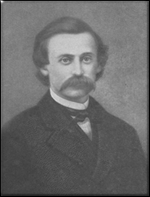
|
|
Henry Timrod
Engraving from a portrait in the possession of the Honorable William A. Courtenay (reproduced with permission in The Poems of Henry Timrod, Memorial Edition, published in 1901 by the B.F. Johnson Publishing Company, Richmond, Virginia) |
Although young Henry and his family were left in impoverished circumstances following the early death of his father, the elder Timrod had had the foresight to provide for his son's education. Henry attended Charleston's finest school, where his classmates remembered him as "silent and shy, full of quick impulse, and with an eager ambition, insatiable in his thirst for books, yet mingling freely in all sport, and rejoicing unspeakably in the weekly holiday and its long rambles through wood and field."
Timrod left his boyhood home to continue his education at the University of Georgia. Although his college years were punctuated by recurring bouts of illness and insufficient funds, he nevertheless perservered and managed to graduate. Returning to his beloved Charleston, he tried for a time to practice law but found that he had no real aptitude for it. When his attempts to gain a university professorship failed, he became a private teacher, an occupation that not only suited him but that left him time to pursue his literary ambitions as well. When the War Between the States broke out, he enlisted immediately in a volunteer regiment but continued to write, the War now being the focus of his poetic outpourings.
The illness that he had contracted during his college years (and that would end his life prematurely in 1867) left him unfit for service at the front, and he was mustered out of the ranks almost as quickly as he had entered them. Still eager to serve the cause in any way he could, he signed on as a war correspondent and was sent to the western theater after the Battle of Shiloh. The rough and tumble life of a battlefield journalist scarcely suited him any better, however; by 1864 he was back home in Charleston serving as an editor for the South Carolinian and writing emotion-packed patriotic editorials.
Although his health was failing rapidly, he married and fathered a son, who died shortly after the end of the War, when South Carolina was still reeling from the devastation visited upon her by an army eager to punish the state for her role in instigating the conflict.
When the end came, it came quickly. After a final bout with consumption, Timrod died October 7, 1867. He was buried next to his son in the graveyard of Trinity Church in Columbia, South Carolina. One of his pallbearers was former Confederate cavalry leader and future South Carolina governor Wade Hampton.
A fierce Southern patriot -- almost, some might say, an instigator -- whose poetry and song lyrics inspired many a Confederate soldier and civilian during the course of the War, Timrod is best remembered today for his magnificent "Ode at Magnolia Cemetery," possibly the finest memorial verses to come out of the four-year conflict.